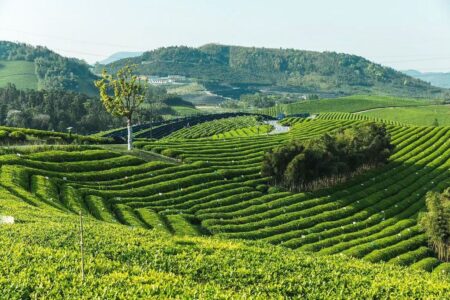Paving a New Path for Ingredient Sourcing

Pluck Tea aims to improve the quality of tea in the Canadian foodservice industry while employing sustainable strategies to reduce its carbon footprint such as using locally-sourced ingredients. By Anne-Marie Hardie
Pluck Tea is transforming the Canadian tea industry one sustainably-sourced ingredient at a time. The journey began with the Toronto, Ontario-based company’s founder, Jennifer Commins, who was on a quest to introduce quality tea to the foodservice industry and fill a much-needed gap. She wanted to ensure that she had the right product for the Canadian market. This product would not only showcase the wonderful nuances of the tea but would be created sustainably. In some areas, like packaging, a sustainable process and product had already been created. However, in other areas, she needed to think outside of the box to discover innovative ways lessen her carbon footprint.
Every tea tale has a beginning, and for Commins, her adventure with the beverage began as a child in her parents’ home. “I was brought up by two British parents, tea was simply a part of our daily routine,” she said. Although she was passionate about the beverage, Commins had never considered the industry as a potential career. Before Pluck Tea, she had a successful career as a sales representative for a German furniture manufacturer. As part of the job, Commins often entertained clients at some of the top restaurants in Toronto. It was during these events that she identified a dramatic gap in the restaurant industry. “I was entertaining a lot of clients at some wonderful Toronto restaurants,” said Commins. “Coffee had come a long way, but there was a huge disconnect between the tea and the restaurant scene. It was an afterthought.”
Where others would simply settle for a bad cup of tea, Commins saw an opportunity. “There is so much that you could do with tea,” she said. “And as the idea began to percolate in my head, an advertisement for a tea sommelier course popped into my inbox. I was fascinated.” She took the course and began to set the groundwork for her future in tea.
Not wanting to be just another tea company, Commins made it her mission to evolve the Canadian foodservice industry’s understanding of the potential in tea. “When we work with an existing restaurant,” she said, “we buy back their tea and donate it to local charities such as women’s shelters and food banks.” In addition to simply being the right thing to do, Commins shared that it was a great tool to help remove the barrier for change. “We’ve been doing this from the very beginning. We wanted to create a vibrant marketplace that was great for everyone.”
Cultivating a Uniquely Canadian Tea
From the beginning, Commins has had a clear vision of what her company would look like. This included sustainable sourcing and developing her own blending recipes. “The pre-blended products that were already in the industry just didn’t get me excited.” And so, she decided to create her own.
When it came to blending teas, Commins wanted to create teas that integrated local ingredients. Instead of going to ingredient suppliers, she sourced the ingredients from local farmers. “Toronto is in the fruit belt, so we have a lot of incredible ingredients right in our own backyard.” The result is a truly national tea brand that features blueberries from Nova Scotia, cranberries from Muskoka, Ontario, maple syrup from Quebec, grape skins from Niagara and lavender from Prince Edward County, Ontario.
“In the beginning, no one took me seriously. It took a while to convince the farmers to work with me,” shared Commins, adding that pushing for this shift in ingredient sourcing was well worth the initial challenges. By using local ingredients, Pluck Tea not only reduces its carbon footprint by decreasing the distance that the ingredients travel, Commins also helps extend the lifecycle of portions of the ingredients that would have previously been composted.
Chocolatier Michael Sacco, of Toronto-based Chocosol Traders, is one of Pluck Tea’s local partners. Sacco initially connected with Commins while sourcing ingredients. “I believe that we may have been using the same lavender producer,” said Sacco. “There’s a natural synergy with Jennifer’s interest in crafting local tea, and Chocosol’s products, which we strive to contain at least 40 percent local ingredients. Chocosol aims for a cradle-to-cradle production philosophy – this includes upcycling waste chocolate into biochar for its rooftop garden. Commins is also interested in the concept of upcycling and is trying to find sources where Pluck Tea could incorporate ingredients that would have previously been composted.
After some previous rocky partnerships, Chocosol had found the perfect match in Pluck Tea. “We were looking for someone who is consistent in their purchase orders, and that celebrates their relationship with you,” said Sacco. “In our business, we work so closely with our producers and customers, we want to have relationships with people that we like.” Today, Chocosol delivers cacao shells and nibs for Pluck Tea’s blending, twice monthly to ensure freshness.
Sarah Allinson-Chorabik, co-founder of Ontario Honey Creations, met Commins through Feast ON Ontario Culinary Tourism Alliance, an organization that is hyper-focused on local food. Sarah and her husband Peter Chorabik initially ventured into the bee industry as volunteers for the Toronto Bee Rescue, which provides free honey bee swarm removal in the Toronto area. However, they quickly fell in love with bee keeping and decided to create their own sustainable business. “Most bee keepers do one massive harvest,” shared Allinson-Chorabik. “We harvest by bee yard. This means that the taste of the honey will vary, both by yard and by what the bees are foraging on during that season.” In Pluck Tea, Allinson-Chorabik found a company that held similar values, making the partnership a natural one.
The initial meeting between Pluck Tea and Ontario Honey Creations took place in Hockley Valley, near the location of their one of their beehives. It was here that Commins not only tasted the honey but was also able to meet the producers, the bees. It was an ingredient experience unlike any other, revealing the perfect honey for Pluck Tea’s Honey Chai. “The summer blossom honey has a more traditional taste making it ideal to blend with tea,” said Allinson-Chorabik.
Pluck Tea’s ingredient sourcing is far from conventional. With each new ingredient proposed, the Pluck Tea team is challenged with finding a local supplier. However, it is a challenge that Commins happily embraces. “The flavours we have in our tea come from actual ingredients,” she said. “Cacao shells or chocolate nibs, instead of chocolate flavouring.”
When asked by other companies about how to adopt sustainable practices, Commins recommends taking a detailed look at the lifecycle of their existing products to see if there is any way to extend them. The key is to put your own unique, local footprint on your product, creating not only a sustainable business but also one that will resonate with your customers. Today, the majority of the ingredients in Pluck Tea’s blends are sourced locally, with one big exception – the tea itself. “One day I hope that I will be able to say that I’m using Canadian-grown camellia sinensis,” said Commins. “Until then, we work with tea hunters from around the world ensuring that we source ethical tea that is produced sustainably.”
Anne-Marie Hardie is a freelance writer, professor and speaker based in Barrie, Ontario. She may be reached at: [email protected].



